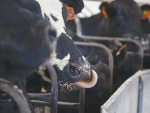Generally nutritional scours can be caused by changes in amount and type of milk fed to calves. This can occur when changing brand of milk replacer or by changing from cow milk to milk replacer.
Also, nutritional upsets in calves could be triggered by stress from exposure to bad weather, vaccinations, dehorning or trucking.
Nutritional scours are not too dissimilar from pathogenic scours due to water loss and dehydration.
Prepare a plan on how and when to treat calves scouring, making sure everyone working with the calves is aware of it.
As dehydration occurs rapidly in calves, it is important to be observant and intervene promptly.
Severity of scours can be monitored by observing the following:
- Frequency and quantity of scours
- Mental responsiveness- alert or depressed
- Suckling frequency
- Sunken eyes
- Weakness
- Gum condition -- bright or pale.
It is important to isolate the affected calves, keep them warm and keep them on dry bedding.
These calves should be given electrolytes, which replace body water and provide minerals such as sodium, potassium, chloride and energy. If scouring persists more than a day, contact a vet.
It is always best to prevent nutritional diarrhoea. The key prevention strategy would be to ensure calves get at least 2L of colostrum by suckling or bucket feeding within the first six hours of life and a further 2L within 12 hours.
Secondly, a functional fibre source such as Opticell Plus UF could be mixed into the milk or milk replacer to assist the digestion and to provide the necessary nutrients in the hindgut to ensure firmer stools and re-absorption of water.
• David Isaac is animal health, innovation and research manager at BEC Feed Solutions, Australia.

















